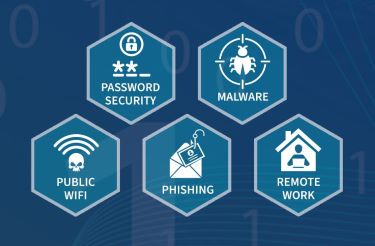
A Computer Security Specialist's role is aimed at safeguarding an organization's digital assets from cyber threats. One primary duty is to conduct comprehensive risk assessments to identify vulnerabilities. In addition to strategic planning, Computer Security Specialists perform regular security audits and assessments. These audits ensure compliance with industry regulations and standards, such as GDPR, HIPAA, or PCI DSS. By meticulously monitoring and analyzing security logs and reports, they can detect and respond to security incidents swiftly and effectively.
Proactive measures allow specialists to identify weaknesses in systems and applications before cyber attackers do. By simulating cyberattacks through penetration testing, they can pinpoint potential entry points for hackers and implement preemptive countermeasures. When security breaches or incidents occur, Computer Security Specialists lead incident response efforts. This involves investigating security breaches, containing threats, and implementing remediation measures to prevent similar incidents in the future.
In the realm of security tools and technologies, Computer Security Specialists are adept at utilizing a variety of solutions. This includes firewalls, intrusion detection systems (IDS), antivirus software, encryption tools, and more. They implement and configure these tools to monitor and protect networks and systems, ensuring a multi-layered approach to cybersecurity.
Cryptography: Understanding encryption techniques and algorithms used to secure data. Courses in cryptography delve into encryption methods, hashing algorithms, digital signatures, and cryptographic protocols. This knowledge is essential for securing sensitive information and communication channels.
Risk Management: Courses on assessing and mitigating security risks within organizations. Risk management coursework focuses on identifying, analyzing, and prioritizing risks to an organization's assets. Security specialists learn to develop risk management strategies, implement controls, and create incident response plans to address potential threats effectively. Security Policies and Compliance: Understanding legal and regulatory requirements for data protection and privacy. Courses in security policies and compliance cover laws such as GDPR, HIPAA, and PCI DSS.
Network Security: Detailed study of network security principles, protocols, and technologies. Network security coursework covers topics such as firewalls, intrusion detection/prevention systems (IDS/IPS), virtual private networks (VPNs), and secure protocols (e.g., SSL/TLS). Understanding network security is essential for securing data transmission and preventing unauthorized access.
CompTIA Security+ is a widely recognized certification that validates cybersecurity skills. It covers essential topics such as risk management, cryptography, network security, and identity management. Security+ holders demonstrate expertise in securing networks, devices, and applications against threats. This certification is valuable for cybersecurity professionals and IT administrators responsible for security measures. Security+ is compliant with ISO 17024 standards and is recognized by government and industry organizations.
| Certificate | Requirements | Exam to be Taken |
| Network Security | Network defense, intrusion detection, firewall management | Certified Information Systems Security Professional (CISSP) by ISC² |
| Incident Response | Vulnerability assessment, malware analysis, forensics | GIAC Certified Incident Handler (GCIH) by Global Information Assurance Certification (GIAC) |
| Cloud Security | Infrastructure protection, data security, cloud compliance | Certified Cloud Security Professional (CCSP) by ISC² |
| Industrial Control Systems | ICS security, SCADA protection, critical infrastructure defense | Global Industrial Cyber Security Professional (GICSP) by GIAC |
| CompTIA Certification | Security principles, risk management, threat detection | CompTIA Security+ (SY0-601) |
CompTIA Network+ is a certification focused on networking concepts and practices. It covers topics such as network architecture, protocols, troubleshooting, and network security. Professionals with Network+ certification have a solid understanding of how networks function and are secured. This certification is ideal for individuals seeking roles in network administration and technical support. Network+ is recognized by employers globally as a benchmark for networking proficiency.
As cybersecurity threats continue to evolve, Computer Security Specialists stay abreast of the latest developments. They actively seek out cyber threat intelligence from various sources to proactively identify emerging threats and vulnerabilities. This constant vigilance and adaptation to new security challenges are essential for maintaining a strong and resilient security posture for the organization.
Let's develop our own Active Directory lab in Windows, make it vulnerable, hack it, and then learn how to patch it.
National Cyber Director, Harry Coker, sat down with Forbes Senior Writer Jabari Young to discuss the challenges the US faces with regards to cyber security threats.
This is an animated video explaining wireless password security options. It explains WEP, WPA, WPA2, WPA3, WPS, and Access Control. It also explains AES and TKIP.
This video covers cleaning a badly infected system with malicious drivers, fake antivirus, xmrig cryptominers and more. How to remove such threats? Use the tools we revealed.
A Computer Security Specialist is responsible for ensuring the confidentiality, integrity, and availability of an organization's digital assets. By implementing cybersecurity measures, conducting assessments, responding to incidents, and raising awareness, they play a critical role in protecting sensitive information and mitigating cyber risks. Their work is essential in today's digital landscape, where cyber threats continue to evolve, making cybersecurity a top priority for organizations worldwide.
Attending college offers benefits beyond academic learning. Students are exposed to diverse perspectives that challenge their thinking. This fosters problem-solving and communication. College is also about social skills. Whether through student organizations or sports teams, students develop leadership skills and build lasting friendships.
This website is not affiliated with any educational institution, and all trademarks are the exclusive property of the respective owners. All copyrighted works on this website are offered for educational purposes only, governed by the four-factor rule, section 107 of the Copyright Act. CampusInspector.com is the work of a group of students in Bangkok, using data from the US Department of Education, Postsecondary Education Data System (IPEDS). If any information is incorrect, please contact us with updates.